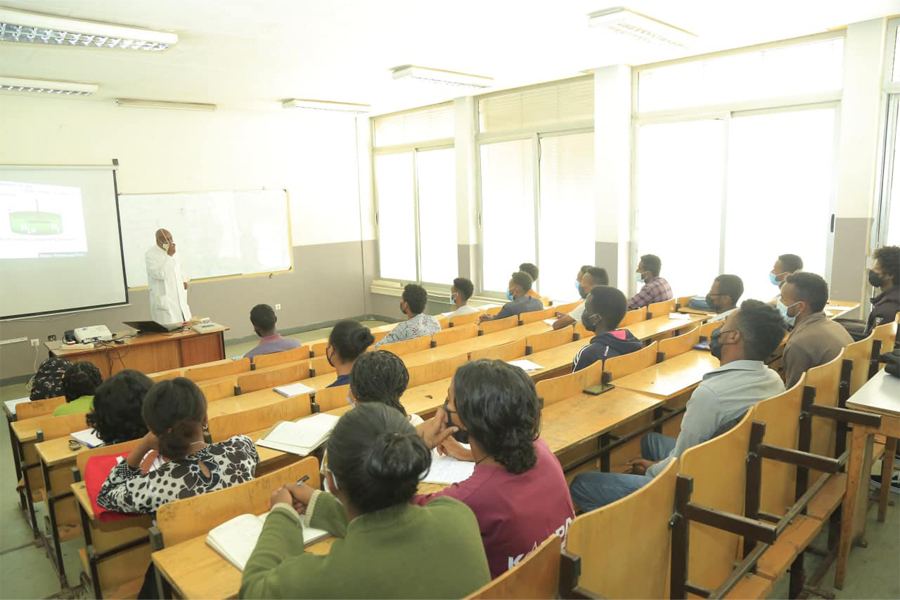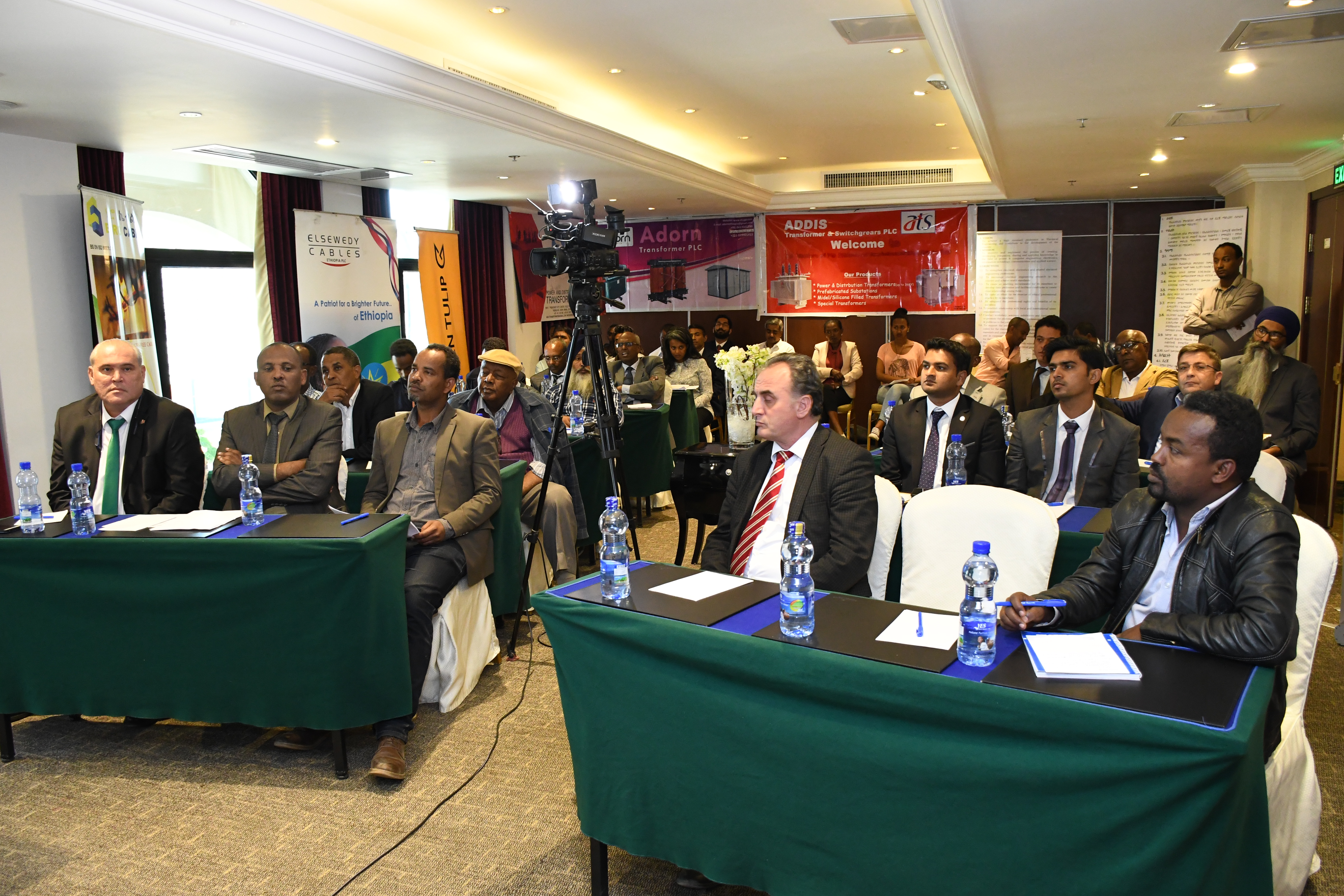
Fortune News | Jun 11,2022
May 18 , 2019.
The address made by Prime Minister Abiy Ahmed (PhD) to medical practitioners was not as disrespectful to the profession as it was made out to be through excerpts that were taken out of context. But the fact that he hit a nerve was clear.
Medical interns across the country were protesting, and in some cases striking, against low pay and benefits, long working hours and poor medical facilities. The Prime Minister merely tried to make the point that it was all a two-way street, and that the professionals were not as perfect as they expected the conditions they worked in to be. His comment about ministers going overseas for illness that require as simple a medical treatment as a cold was not received warmly.
Both sides actually had a point. There are challenges facing the medical profession that are directly contributing to a poor provision of services. Unfortunately, this substantive debate was barely taken up by the body that should have led in organising, setting agendas and making demands on behalf of the professionals, the Ethiopian Medical Association.
A lack of professional representation is a problem that affects the professional class in Ethiopia. Take the Ethiopian Journalists Association, which recently celebrated its 50th anniversary. It was not at the forefront of speaking out against the jailing of journalists. Today, it remains a weak voice at a time when what little professionalism left in the field is fast giving way to partisanship.
Most associations are too insignificant to play a leading role in the evolution of the profession. Thus, when demands come, it is often when the professionals are on their knees, and their lack of productivity has already affected the provision of services and the quality of goods. There are few bodies working to organise, recognise shortcomings and advocate policy and administrative changes.
The few and far between sincere attempts at elevating professions are usually carried out at the insistence of foreign institutions. Even here, the effort to degrade such platforms of experience sharing into opportunities for allowances and holidaymaking is a painful reminder of the lack of attention afforded to developing professions in Ethiopia.
The historically centralised and undemocratic nature of political and economic institutions, the impacts of which are still perceptible, has been the primary culprit behind apathetic professional associations. An environment where merit is not rewarded was created. This automatically removes any incentive for elevating professional standards. Professionalism is no longer a priority in this case either for employers, mostly government agencies, as well as employees.
Still, professional associations proliferated, even if they are not worth much more than the paper their organisational objective is written on. Most had an organisational structure that gave the illusion of associations. They had presidents, held periodic meetings and had members. But they rarely carried out advocacy, engaged whenever there were industrial actions or supported researches.
The existence of professional associations has been more beneficial to leaders, who have used it for personal networking, than the profession the integrity of which they established to uphold.
If there is now a change of heart by government to address gaps in economic institutions through policy reforms, the advantages of this are lost on the associations. A more free market economy gives way to competition, entailing the progress and transformation of professions. At such a time, when they have the greatest opportunity to contribute in building a productive society, associations have a business-as-usual attitude. A culture of indolence, which is a residue of past experiences, still affects the organisations.
There are indeed a number of associations that speak out, serving as voices for professions. But even they are limited to voicing wrongful practices in the industry. They do not serve to provide the profession with a vision and goal, give credibility to the profession and become a repository of the knowledge, ideas and experiences of those in the field.
As matters stand now, most professional associations do not have credibility in the eyes of professionals. This is a significant factor that contributes to a lack of financing, which mostly comes from membership fees. Professionals either do not hold associations in high enough regard to want to join, lack the awareness of the possible benefits of membership or even the existence of these organisations.
Professional associations could start by organising periodic workshops, increasing visibility on social media and approaching younger members of the profession. Bringing to the forefront leadership that has recognition within the profession can help bring about credibility.
Given that resources will continue to be a challenge, sponsoring researches might be a challenge. But it is well within their capacity to encourage members to carry out researches and create an easily accessible data set on details pertaining to the profession. This can improve awareness and boost credibility in the eyes of members.
Training and education for professionals, the provision of which has greatly been made cheaper through digital technology, should also be a regular duty of associations. These would come in handy in setting the agenda and advocacy work necessary for developing professions.
The relationship between associations and professionals is a two way street. Professionalism must be shown on the part of the former before the latter can be expected to make contributions, either financial or in terms of ideas. In an environment where advocacy on the part of associations is lacking, as well as enthusiasm to further professions, members or possible members will remain as uninterested to make demands through associations as associations would remain insignificant in the evolution of professions.
PUBLISHED ON
May 18,2019 [ VOL
20 , NO
994]

Fortune News | Jun 11,2022

Sunday with Eden | Jun 14,2025

Fortune News | Dec 19,2021

Agenda | Aug 25,2024

Radar | Apr 15,2023

Fortune News | Jan 01,2022

Fortune News | Feb 19,2022

Fortune News | May 07,2022

Fortune News | Apr 16,2022

Fortune News | Feb 16,2019

Photo Gallery | 175665 Views | May 06,2019

Photo Gallery | 165885 Views | Apr 26,2019

Photo Gallery | 156271 Views | Oct 06,2021

My Opinion | 136838 Views | Aug 14,2021

Dec 22 , 2024 . By TIZITA SHEWAFERAW
Charged with transforming colossal state-owned enterprises into modern and competitiv...

Aug 18 , 2024 . By AKSAH ITALO
Although predictable Yonas Zerihun's job in the ride-hailing service is not immune to...

Jul 28 , 2024 . By TIZITA SHEWAFERAW
Unhabitual, perhaps too many, Samuel Gebreyohannes, 38, used to occasionally enjoy a couple of beers at breakfast. However, he recently swit...

Jul 13 , 2024 . By AKSAH ITALO
Investors who rely on tractors, trucks, and field vehicles for commuting, transporting commodities, and f...

Oct 18 , 2025 . By NAHOM AYELE
In a sweeping reform that upends nearly a decade of uniform health insurance contribu...

A bill that could transform the nutritional state sits in a limbo, even as the countr...

Oct 18 , 2025 . By SURAFEL MULUGETA
A long-planned directive to curb carbon emissions from fossil-fuel-powered vehicles h...

Oct 18 , 2025 . By BEZAWIT HULUAGER
Transaction advisors working with companies that hold over a quarter of a billion Bir...